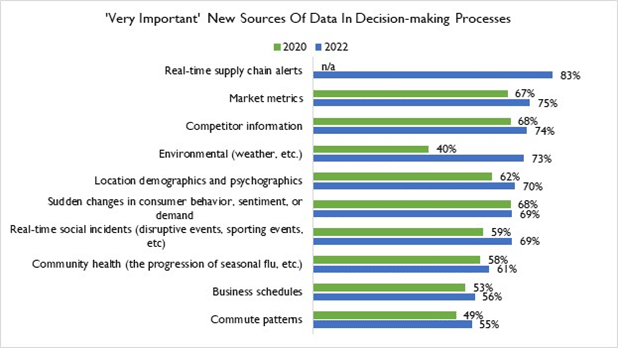RSR’s New Report Highlights Retailer’s Perspectives on AI
Retail Systems Research (RSR) have published their 2022 Benchmark Report “Artificial Intelligence in Retail: What Now?” The report provides a wealth of interesting insights and shows how retailers are pursuing opportunities in artificial intelligence (AI) / machine learning (ML) and how their priorities have evolved since the 2020 RSR Benchmark.
The report is extensive covering application areas including merchandising, supply chain management, real-time analytics, and customer insights. RSR also covers the current state of AI readiness in retail, organizational inhibitors, and technology enablers. We encourage you to check out the research which you can download for free on RSR’s website.
In reviewing the research, Planalytics noted the following callouts:
RSR reported that “…retailers’ number one external challenge continues to be rapid shifts in consumer demand (46% choose it as their top priority from a list of 9 options)”.
RSR also identified how retail’s leading performance or “winners” differ from their peers. In figure 3 on page 5 of the report, retail winners place a significantly higher priority (71% vs. 44%) on the idea that “AI-enabled analytics will fundamentally change how retailers will perform demand forecasting and merchandise planning the next 3 years”.
In figure 4 on page 6, RSR ranks the importance of new sources of data for decision making, with more than 75% of retail winners classifying the following as “very important”: real-time supply chain alerts; market metrics; environmental (weather, etc.); sudden changes in consumer behavior, sentiment, or demand; and competitor information.
RSR’s preview of their AI Benchmark Report a month earlier showed how the rankings of these top new sources of data changed since the 2020 report. Of course, the pandemic and the subsequent supply chain challenges put real-time supply chain alerts at the top of the list (after not registering as a top source in 2020). Aside from this Covid-era issue, the largest gainer in importance was Environmental which nearly doubled (40% to 73%) in two years.
As the leading provider of weather-driven demand analytics, Planalytics validates the growing inclusion of predictive demand analytics by retail businesses. Retailers across all segments and channels have long acknowledged the influence that the weather has on business performance, and it is true that no other external variable changes consumer purchasing as frequently, immediately, and meaningfully as the weather. As more retailers look to advanced analytics including AI/ML, the opportunity to incorporate weather-driven demand metrics to improve plan accuracy, reduce lost sales, minimize inventory costs, and optimize marketing and promotions to gain a sustainable competitive advantage has never been greater. Learn more.

